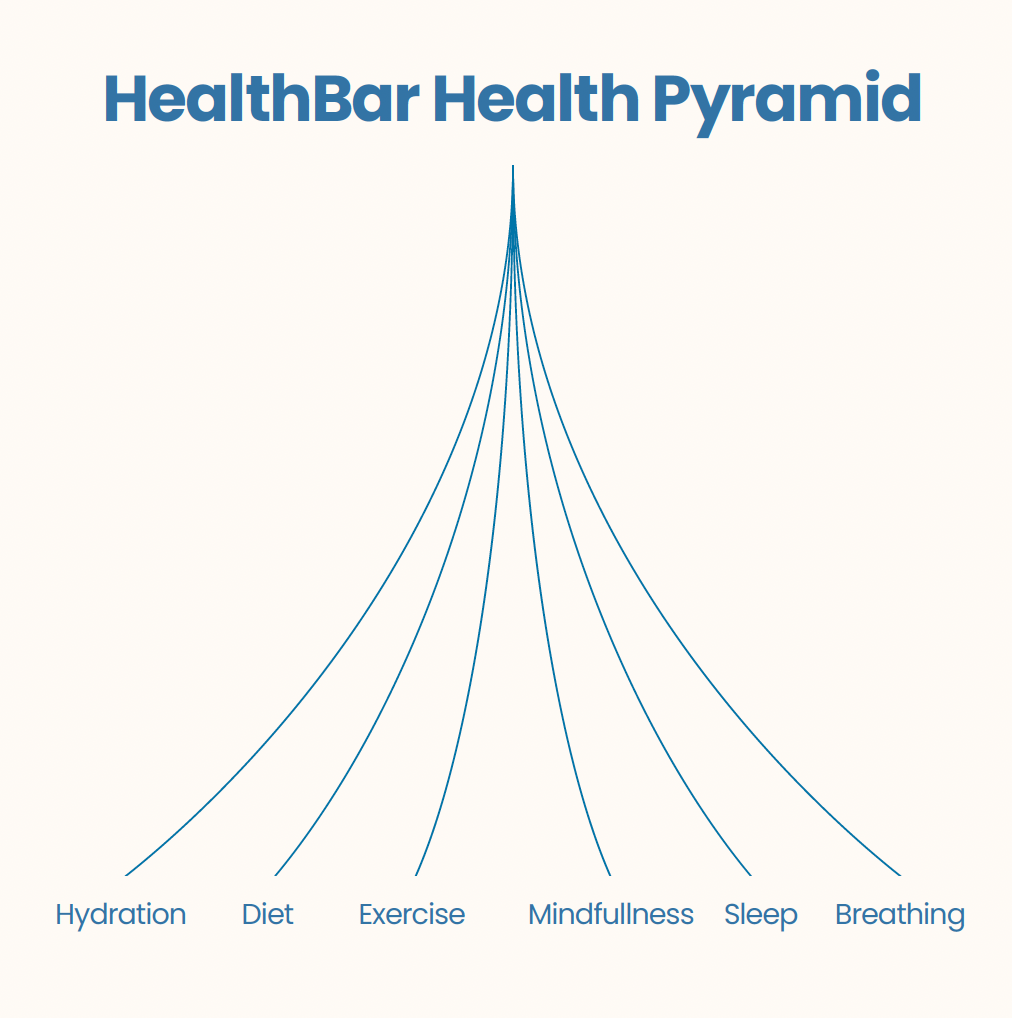Six Simple Habits That Can Transform Team Health and Productivity


Six Simple Habits That Can Transform Team Health and Productivity
You don’t need to be a healthcare expert to understand that when people feel better, they perform better. The challenge is figuring out how to support it in a way that actually sticks.
That’s why HealthBar created a simple, visual framework to help teams build healthier routines: the HealthBar Health Pyramid. It outlines six core areas that influence how people feel each day, from energy levels and sleep patterns to focus, resilience, and mood. Consider this a guide that helps make health more accessible, one habit at a time.
So where do you start if you want to support real, lasting health across your organization? One habit at a time. Let’s explore each one more in depth.

This just in: healthy habits belong in the workplace.
When companies think about improving employee health, the focus often lands on big-picture programs like gym stipends and wellness apps. But the most meaningful change tends to come from something smaller: the habits people build into their everyday routines.
The way employees eat, sleep, move, hydrate, breathe, and manage stress has a direct impact on how they show up at work. These choices influence everything from focus and stamina to mood and resilience — and they’re happening well before anyone logs on for the day.
The impact is measurable. Research shows that productivity losses related to personal and family health problems cost U.S. employers $1,685 per employee per year, or $225.8 billion annually. That just goes to show that prioritizing foundational health habits at work is a strategic way to reduce costly disruptions and improve overall performance.
To help employers take action, the HealthBar Health Pyramid offers a straightforward framework that breaks wellness into six clear, actionable elements employees can actually build into their day-to-day routines.
Support your team by encouraging six key areas of health.
Health can feel complicated, but building it doesn’t have to be. The six pillars of the HealthBar Health Pyramid each influence how people feel and function throughout the day, and when these areas are supported consistently in the workplace, healthy habits become easier to build and sustain. Let’s take a closer look.
Mindfulness
Mindfulness is a state of nonjudgmental awareness of what’s happening in the present moment, including the awareness of one’s own thoughts, feelings, and senses. There are two core components of mindfulness: awareness and acceptance.
Awareness is the ability to observe what’s happening internally and externally in real time. The goal is to be aware of what’s happening in your body rather than getting lost in it.
Acceptance means acknowledging those experiences without immediately labeling them as good or bad. For example, if you notice a feeling of nervousness, simply say to yourself: “I notice that I am feeling nervous.” There’s no need to judge or change this feeling.
Together, these skills help people navigate stress more effectively, which is essential in high-pressure work environments.
Regular mindfulness practices might include meditation, mindful walking, body scans, or simply pausing to check in with the five senses. Over time, these habits pose several benefits, such as:
- Reduced symptoms of depression and anxiety
- Greater satisfaction within relationships
- Improved memory, focus, and mental processing speed
- Improved ability to adapt to stressful situations
- Improved ability to manage emotions
- Reduced rumination (repetitively going over a thought or problem)
Breathing
Breathing is something we do on autopilot, but it’s also an incredibly powerful and accessible tool we can use to bring our bodies into contact with our feelings. When people take a moment to breathe deeply and intentionally, they shift the body out of a reactive “fight or flight” mode and into a calmer state.
There are many breathing techniques that can help create a feeling of calm and help to focus the mind. For example, box breathing (inhale for four counts, hold for four, exhale for four, hold for four) or simply taking longer exhales than inhales can reduce tension and sharpen focus in just a few minutes.
Encouraging employees to take a few intentional breaths before a big presentation or after a frustrating meeting might seem small, but it helps create space for emotional regulation and more grounded decision-making. Over time, a regular breathing practice can reduce baseline stress and boost overall resilience.
Sleep
Sleep isn’t a luxury — it’s a necessity. But for many working adults, it’s also difficult to master. Prioritizing sleep means paying attention to three main factors: how much you get, how well you sleep, and the habits that support it. Here are some general guidelines to follow.
- Quantity: Experts recommend that adults get 7–9 hours of sleep each night.
- Quality: Getting enough sleep matters, but so does the quality of that rest. It’s not just about hours — it’s about uninterrupted, restorative sleep that helps the brain and body reset. High-quality sleep means moving through multiple sleep cycles, including REM, which supports memory, learning, and emotional regulation. When employees consistently get deep, consolidated sleep, they’re more likely to wake up refreshed and ready to take on the day
- Sleep Hygiene: Sleep hygiene refers to the routines and environmental cues that signal to your body it’s time to rest. Consistency is key. That includes going to bed and waking up at the same time every day, powering down devices at least 30–60 minutes before bed, and creating a relaxing wind-down routine. Even small changes like using blackout curtains or keeping electronics out of the bedroom can make a noticeable difference over time.
Common barriers to good sleep include excess screen time, inconsistent schedules, and high stress levels. Encouraging your employees to prioritize routines like turning off devices before bed, avoiding caffeine late in the day, and keeping a consistent sleep-wake schedule can go a long way toward improving rest.
When employees get the sleep their bodies and brains need, the benefits are wide-reaching. Quality rest supports sharper memory, better focus, improved mood, and stronger emotional regulation — all of which contribute to a more engaged and productive workday. Over time, consistent, high-quality sleep can also reduce symptoms of anxiety and help people adapt to stress more effectively, both on and off the clock.
Hydration
Water powers every system in the body, from brain function to temperature regulation to digestion. On the flipside, even mild dehydration can impact how employees are able to show up on the job. That’s why staying hydrated throughout the day is essentially a performance strategy that allows the body to function at its highest level.
There are a number of upsides to prioritizing hydration. Here are just a few:
- Improves: Sleep, metabolism, memory, learning, mood, immune system
- Prevents: Irritability, muscle cramps, fatigue, constipation
Employers can play a big role in making hydration more accessible. Simple steps like placing refill stations in high-traffic areas, offering unsweetened beverage options in break rooms, or providing water bottles during long meetings can go a long way.
Exercise
When people hear the word “exercise,” it’s easy to picture high-intensity workouts or strict gym routines. But physical activity doesn’t need to be intense or time-consuming to be effective. At its core, movement is just about helping the body feel and function better, and that can start with something as simple as a 10-minute walk.
Still, getting started can feel intimidating. Some employees may not know where to begin, worry they’re too out of shape to exercise (which is a common myth!), or assume they don’t have the time. The best way to break down those barriers is to normalize movement as a flexible, personal practice, not a performance.
Employers can help by building a culture that values movement in all its forms. That might look like offering flexible schedules that make it easier to exercise, encouraging active breaks, sharing accessible fitness resources, or simply creating space for conversations around physical health.
Diet
Simply put, diet refers to the foods and drinks we consume each day, and those choices directly influence how we feel and function. But in a world of quick fixes and conflicting nutrition advice, it’s easy to feel overwhelmed by how to “eat right.”
The good news is that eating well doesn’t have to mean following a strict plan. Small changes like focusing on whole ingredients or building properly balanced meals of protein, fats, and carbs can make a noticeable impact over time.
Here are a few practical ways employees can make more intentional choices:
- Meal prep: Setting aside time to prepare meals in advance can reduce last-minute decisions and help ensure there’s something nourishing on hand during a busy workweek.
- Make a grocery list: Going to the store with a plan makes it easier to stick to healthy intentions and avoid impulse buys that may not offer lasting fuel.
- Eat off a plate: Sitting down for a real meal rather than grazing or eating from a bag encourages mindfulness and portion awareness.
- Set goals for yourself: Small, personal goals like eating more vegetables during the week or drinking fewer sugary drinks can add up to big changes over time.
- Shop the perimeter: The outer edges of the grocery store usually house fresh produce, meats, and dairy — all solid staples for building a balanced diet.
As an employer, you can play a major role by making nutritious choices easier to access during the workday. Stocking fresh options in the break room, encouraging employees to actually take a dedicated lunch hour, or even bringing in a dietitian are all ways to promote healthy food choices inside and outside of the office.
Partner with HealthBar to help your team build better habits that last.
Supporting employee health starts with making the essentials easier to access — and that’s exactly what HealthBar helps you do. Our Health Pyramid gives your team a clear, actionable path to better health through everyday habits like mindfulness, movement, hydration, sleep hygiene, breathing, mindfulness, and dietary choices.
Want to bring these habits into the workplace? Connect with your HealthBar nurse to learn more. Not a HealthBar partner yet? Reach out today and let’s build a healthier, more resilient team together.
